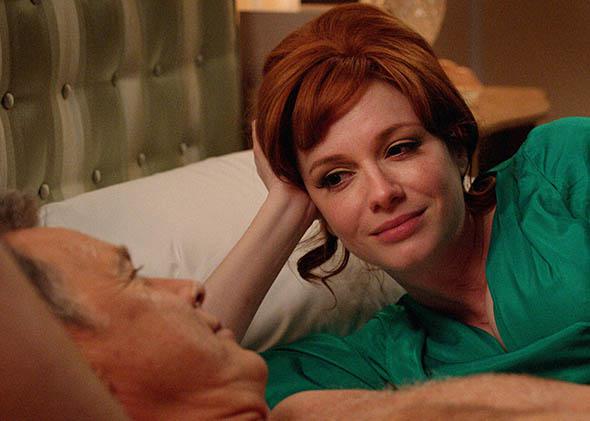Read the rest of Slate’s Mad Men coverage.
John, Julia,
I’ve complained throughout this season that Matt Weiner treats the women on the Mad Men as historical prototypes and the men as narrative characters. One exception to that is sex. When it comes to sex and the sexual revolution, I think Weiner had it right, or at least I think his different approach with each gender forced us to reckon with a certain truth about sex and the fallacy of the so-called revolution that is becoming ever more obvious now and which we—me, very much included—are often queasy to admit.
I couldn’t make the case that the women on Mad Men had no fun having sex. Megan, for example, was a talented seductress and willingly pulled Don into a ménage à trois with her friend Amy earlier in Season 7 when all he wanted to do was go to bed. Joan was very sexually confident and in control, all the way up to the finale when she announced gleefully to her new cowboy Richard, “I want you so much right now!” But even with Joan, one had the sense that her submission to pure pleasure was only intermittent. For the most part, sex for Joan was a social capital, sometimes a burden, sometimes a way to get ahead. My enduring image of Joan and sex comes from Season 6, when her old friend has come to New York to indulge in the new libertine age, and as a man at the club falls all over Joan, she sits on the couch unmoved, unmistakably bored.
And the men? Roger is easy. He’ll take sex any way, sober, high or tripping, with the lawfully wedded and not, with the mini-skirted young and the age appropriate, and famously, with twins on their knees. Don is more complicated. One can find on the Web any number of running tallies of the number of women Don has slept with (something like 20). The headlines often contain the word lothario, but that isn’t quite right. Sometimes Don is just having fun. After the ménage à trois for example, he strutted into a meeting, mojo restored. Usually, though, sex brings up demons for Don, about his past (brought up in a brothel, possibly raped as a kid), about the state of his marriage, and sometimes just actual demons (Rachel, the dead Jewish mistress).
Still, sex for Don is another way to learn something about himself. Maybe the most memorable sexual encounter of the entire show came in Season 6 , when Sylvia Rosen, his married mistress, waited in his hotel room at his beck and call for a sexual fantasy they were constructing. The affair ended painfully, when Sylvia told him, “It’s easy to give up something when you’re ashamed.” That affair brought shame to Don too, because his daughter Sally walked in on them. But it was a personal shame, one that led him closer to his roots and, ultimately, honesty. But Sylvia, always with that gold crucifix around her neck, was referring to the universal, biblical shame of breaking her marriage vows and destroying a second marriage.
Overall, the leading women of Mad Men have heavily carried the consequences of sex. One never heard much about the pill and all its glories on the show. Instead, Peggy has a baby she’s not raising, and from the finale, as Julia elaborated, we understand just how Matt Weiner feels about mothers who abandon their children. Joan has a baby she’s raising alone, and both of them wrestle with the burdens of their children up until the final season. Roger, by contrast, waltzes into the very last episode and writes Joan’s baby—who is also his—into his will, and thus declares himself a hero.
In an interview with Weiner last year, I asked him if he was trying to convey something about the sexual revolution. “I’m not Catholic, but I did grow up after the AIDS crisis, so I have my own concept of how that ended.” He emphasized that he did not want to judge the people he portrays, but he did want to make it clear that, in some sense, “there is no sexual revolution.” Someone like Roger, he added, could look at all the changes and say, “bring it on,” but for most everyone else it was confusing, and often a painful adjustment.
After I confirmed it with him, I put Weiner’s reservations in the same mental file with Ross Douthat’s compelling analysis of post-sexual revolution America, in which he argues that it worked out well for the college-educated elite but not for the rest of the country, largely because of rising rates of single motherhood. But in the year since, I’ve thought that maybe the reservations are not just class bound. When I wrote the The End of Men, I made the argument that hookup culture was largely good for women, because it allowed them to have relationships in college but not let commitments get in the way of their ambitions.
While statistically this still seems to be true—college-educated women still eventually get married, and happily—psychically it seems less so. In the past year, the story of college women and sex has largely been about gang rape, sexual abuse, and a college judicial process that doesn’t protect them. A drive for sexual freedom still persists, but it coincides with an overwhelming feeling of vulnerability. I have no idea how to reconcile these two strains. But I get the sense that unlike most directors, Weiner was not just using sex for viewer pleasure. He understood that there’s something about the sexual revolution that keeps coming back to haunt us.
John, Julia, it’s been an honor to be part of this club with you guys.
I’m sorry I said all those shitty things to you,
Read the previous entry, by Julia Turner | Read the next entry, by John Swansburg
